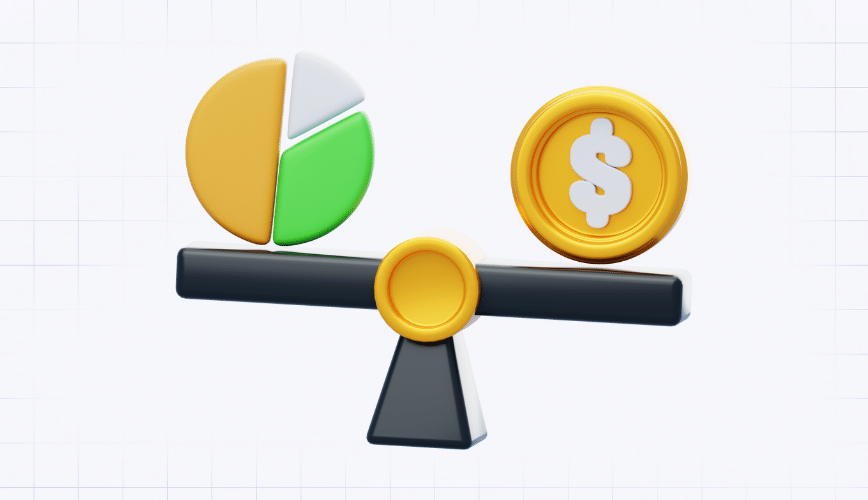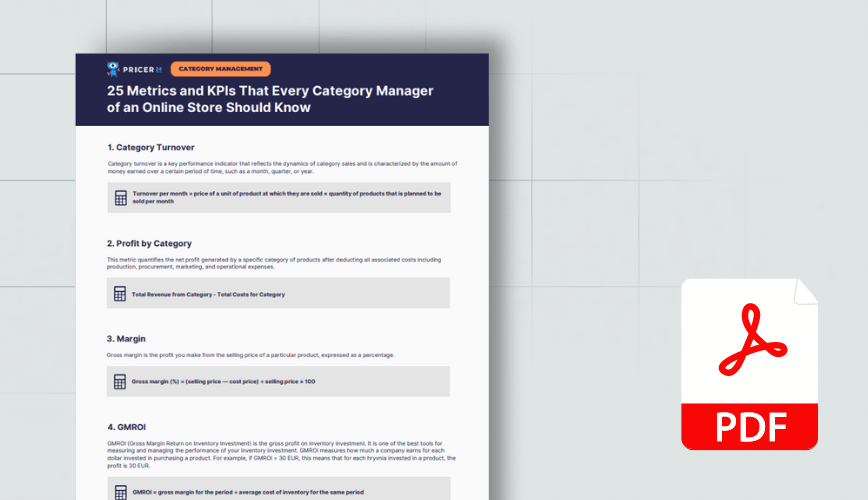A category manager is responsible for overseeing a specific assortment of products, treating each product category as an individual business unit. Category management emerged in the fast-moving consumer goods (FMCG) market in the USA in 1985 as companies began organizing their product assortments based on the similarity of goods or their relevance to consumer needs. The approach gained substantial traction in the 2000s.
Today, category managers hold a pivotal role in modern retail due to the critical nature of category management in enhancing retail effectiveness — specifically, in bolstering sales and profits.
This article explores the role of a category manager, outlining the key performance indicators (KPIs) they oversee, the skills they should possess, and the tools available to streamline their work processes.
What Do Category Managers Do?
Category Managers’ Skills
Category Manager KPIs and Tools to Help Achieve Them
Benefits of Effective Category Management
What Do Category Managers Do?
The tasks of a category manager in e-commerce include:
- Assortment formation in each category based on the store or chain’s assortment policy and that of its competitors.
- Supplier cooperation, including search, contractual work, and relationship management. In large chains, this task is delegated to buyers.
- Inventory management.
- Setting prices for products within each category according to the company’s pricing policy.
- Participating in product promotion through promos and online merchandising.
It is worth noting that the formation of the assortment is a fundamental aspect of this position. The product line manager may only be partially responsible for other tasks, depending on factors such as the company’s size, organizational structure, and business processes. For example, some companies have a separate department that handles pricing, while in other cases, the duties of the category manager and purchasing director may be divided between the two roles.
The specific duties and KPIs of the category manager are determined by the tasks assigned to them in the company.
25 KPIs That Every Category Manager Should Know
Unlock the essential checklist for Category Managers: Dive into key KPIs, their definitions, and calculation formulas now!
Category Managers’ Skills
The role of category manager demands a diverse skill set that blends analytical abilities, strategic thinking, and a deep understanding of consumer behavior. Let’s delve into the essential competencies for achieving success in this role.
1. Analytical intelligence
The сategory manager must possess strong analytical skills to effectively interpret vast amounts of data. They should understand market trends, sales indicators, and consumer behavior patterns; be able to comprehensively analyze the competitive environment; and know how to conduct an assortment analysis of competitors and a competitive pricing analysis. All of these things help the category manager develop effective assortment, pricing, and promotional strategies.
2. Product knowledge
A category manager must have knowledge of the features, benefits, and specifications of products in the reporting category. This allows them to make informed decisions about the assortment and positioning of goods to meet consumers’ demands and needs.
3. Merchandising expertise
The ability of a category manager to attractively present products on the shelf significantly affects customer engagement and sales efficiency. Understanding key merchandising principles is important not only for category managers of physical stores. Online stores also benefit from constant optimization of digital shelves through competent online merchandising.
4. Strategic vision
Category managers must possess a strategic mindset to develop and implement long-term category plans aligned with overall business goals. This includes forecasting market trends, identifying growth opportunities, and aligning the product mix with customer requirements and company goals.
5. Strong communication skills
Category managers often cooperate with different departments (marketing, logistics, finance) and conduct negotiations with suppliers. Building strong business relationships and effectively communicating strategies and ideas are critical to category success. Therefore, a category manager must have effective communication and cooperation skills.
6. Technical skills
Category managers often use data analytics platforms, inventory management systems, and price optimization tools. Having basic technical skills enables them to use data effectively and obtain critical information for decision-making.
7. Adaptability
Given the dynamic nature of retail, the ability to navigate unexpected situations, quickly calculate different options, and choose the best option in the shortest possible time is an important skill for category managers.
A successful category manager possesses a combination of analytical, strategic, technical, and interpersonal skills. These skills allow them to navigate the complex retail environment, drive category growth, and ultimately contribute significantly to overall business success.
To evaluate the work of an e-commerce category manager, it is customary to focus on the following key performance indicators (KPIs):
- Sales and revenue metrics: Category turnover, category profit, margin, and gross margin return on investment (GMROI) are key KPIs for category managers.
- Market share and penetration: Evaluating these metrics helps the category manager understand the category’s market position relative to competitors.
- Inventory management efficiency: Monitoring inventory turnover and product availability plays a pivotal role in maintaining optimal inventory levels, preventing both surpluses and shortages.
- Customer engagement and satisfaction: Monitoring customer-centric KPIs such as net promoter score (NPS), customer retention rate (CRR), and average order value (AOV) helps gauge category appeal among consumers and their overall satisfaction with the shopping experience.
- Promotion effectiveness: Metrics like website traffic, conversion rate, return on advertising spend (ROAS), and customer acquisition cost (CAC) typically fall within the marketing department’s realm of influence. However, these metrics serve as crucial tools for the category manager to gauge the impact of promotional campaigns developed in collaboration with the marketing team.
To achieve set KPIs, the category manager has to control many processes, analyze large data sets, and react quickly to market changes. Therefore, in many modern retail companies, employees of commercial departments take advantage of automation software.
- Assortment analysis tools offer lists of products worth including in your assortment based on market analysis, historical sales data, seasonality, demand fluctuations, and more.
- Tools for monitoring and optimizing prices, like the Pricer24 platform, allow category managers to monitor competitors’ prices and adjust their own pricing strategies in real time based on market dynamics and competitor data.
- Modern inventory control tools help you optimize your inventory levels, track inventory movements, and prevent stock-outs or overstocks. Systems such as TradeGecko, Zoho Inventory, and SAP Inventory Management optimize inventory processes and increase operational efficiency.
- Services for planning promotions help with planning and coordinating promotions, launching discounts on products within a category, and promoting special offers for seasonal events or brand activities.
- Retail analytics software tools like Microsoft’s Tableau and Power BI allow you to extract actionable insights from sales data, customer behavior, and market trends.
Benefits of Effective Category Management
Effective category managers have a significant impact on the business’s overall success and profitability. Here are some key benefits of category management that make this role important within a retailer’s team:
- Higher profit and release of working capital
- Increased stock turnover
- Increased sales
- Minimization of risks during marketing activities
- Optimized category assortment
- Lower/Reduced costs through procurement optimization and minimization of excess inventory
- Greater flexibility and adaptability to changing market conditions and demand fluctuations
Conclusion
The category manager is an indispensable role within a contemporary retail business. Efficiency in managing product ranges is pivotal for the overall success of the company. The category manager’s role involves a continuous, determined effort to cater to consumers, armed with a combination of knowledge, skills, business intuition, and, of course, automation tools that streamline routine tasks. Tailoring strategies for each product category, analyzing consumer trends, and continually optimizing assortment and pricing strategies are the key pillars for success in modern retail.
FAQ
What skills does a category manager need?
To become an effective category manager, you need to possess analytical skills, product knowledge, strategic thinking, communication skills, negotiation skills, basic technical skills, and adaptability.
What is a typical day like for a category manager?
A typical day for a category manager involves a combination of tasks:
- Analyzing sales data and market trends to assess category performance
- Collaborating with marketing and sales departments to plan advertising campaigns and product launches
- Conducting meetings with suppliers to discuss terms, discuss new products, and manage stock levels
- Reviewing and adjusting pricing strategies based on market needs and competitor analysis
- Developing strategies to optimize the product range and increase overall profitability
- Tracking inventory levels, ensuring appropriate inventory levels, and avoiding excess inventory or shortages
How important is category management in retail?
Category management is of paramount importance in retail for several reasons. First, it directly affects sales by ensuring that the right range of products is available to meet customer demands. Effective category management also leads to better margins, lower costs, and increased revenue. Further, a well-managed category means customers find what they need, improving the shopping experience. Finally, understanding market trends and adapting strategies helps a company stay ahead of competitors.
Overall, category management is fundamental to increasing profitability, improving the customer experience, and remaining competitive in the retail industry.









